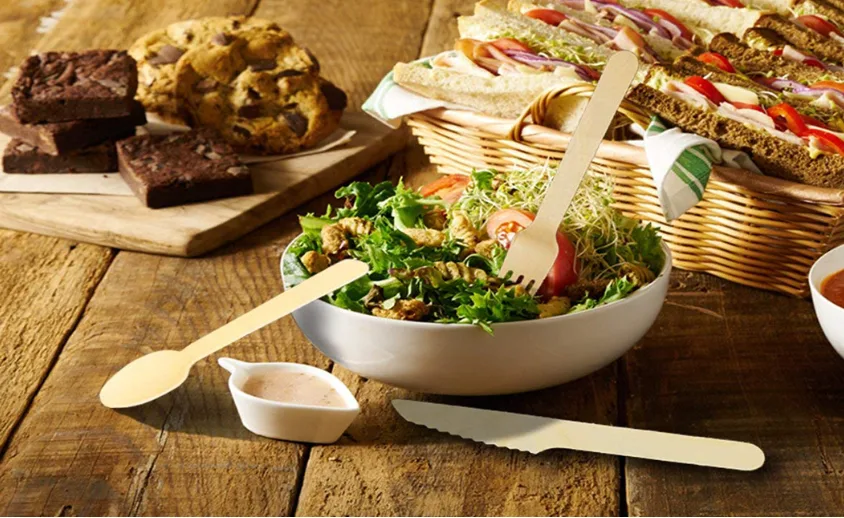The Sustainability Mandate: Fueling the Market Growth of Wooden Cutlery and Skewers
The global imperative to combat plastic waste has fundamentally reshaped the disposable goods market. Today, environmental responsibility isn’t optional—it’s a core mandate for consumers and businesses alike. This rapid, non-negotiable shift has created massive demand for high-quality, eco-friendly alternatives, with wooden cutlery and BBQ skewers leading the commercial transition.
This document explores how these natural wood products are successfully meeting sustainability demands while maintaining superior performance, detailing the material science, market drivers, and critical quality standards that define this new era of disposable dining.
The Strategic Advantage of Wooden Cutlery
Wooden cutlery has evolved from a niche concept into a mainstream necessity, serving as a direct, biodegradable replacement for plastic.
Material Integrity and Composition
Disposable utensils are primarily engineered from dense, light-colored hardwoods like birch, maple, and beech. These woods are chosen specifically for their optimal balance of strength, smoothness, and neutral taste, making them ideal for food contact.
Crucially, wooden utensils are 100% compostable and biodegradable. Unlike plastic, which pollutes landfills and oceans for centuries, wood naturally decomposes within weeks, seamlessly returning to the earth. This reliance on renewable resources (often sourced from certified, sustainably managed forests) forms the basis of their environmental superiority.
Manufacturing Precision: Quality Through Process
Beyond basic wood cutting, advanced engineering is needed to create a high-quality, splinter-free wooden utensil:
Selection and Preparation: Thin sheets of durable, food-safe wood are sourced.
CNC Shaping: The sheets are precisely cut into uniform forks, spoons, and knives by sophisticated computer numerical control (CNC) equipment.
Refinement: To ensure a smooth, comfortable mouthfeel and get rid of roughness, utensils go through a multi-stage sanding and polishing process.
Heat Treatment: A necessary step in which wood is heated to lower its moisture content and stop microbial growth, warping, and cracking.
Finishing (Optional): While many products are left untreated for complete compostability, some are given a thin layer of food-safe wax or oil to improve their water resistance.
Market Drivers and Applications
The adoption of wooden cutlery is being accelerated by global legislation banning single-use plastics and by strong consumer demand. Its applications are broad and critical to the food service supply chain:
- Quick-Service Restaurants (QSR): Replacing plastic for all takeout and delivery orders.
- Event Catering: Providing a stylish, sustainable option for large festivals, corporate parties, and weddings.
- Corporate & Travel: Used by airlines, schools, and offices to meet green initiative targets.
- Retail: Available to households prioritizing daily sustainable choices.
Many businesses pair their cutlery with other plastic-free packaging, such as durable, compostable clamshell container, creating a holistic zero-waste serving solution.
BBQ Skewers: Performance and Environmental Responsibility
BBQ skewers are fundamental grilling accessories that must balance durability under heat with ease of disposal.
Choosing the Right Material
Because of their affordability and environmental advantages, wooden and bamboo skewers dominate the disposable grilling market, even though metal skewers can be reused.
Bamboo is the material of choice for professional use and heavy grilling because of its exceptional tensile strength, flexibility, and quick growth.
Wood: Usually used for cold appetizers or lighter hors d’oeuvres.
Both materials are completely biodegradable and heat-safe, meaning they don’t conduct heat like metal does.
Quality and Use Protocol
Strict quality controls are followed by a committed bamboo skewers manufacturer to guarantee product performance and consumer safety:
Strength and Uniformity: For skewers to support heavy foods and avoid splintering, they must be carefully shaped, dried, and polished.
Safety Check: Each skewer’s consistency is examined, and its point needs to be sharpened for effortless piercing.
Best Practices for Grilling: Skewers should soak in water for 30 to 60 minutes before being put on the grill to avoid burning while in use. When exposed to indirect heat, they function best.
The Course of the Future: Prospects for the Market
Innovations that solve the lingering issues with wood and bamboo products are driving the market’s rapid expansion for sustainable disposables:
| Challenge Area | Innovation and Mitigation Strategy |
| Moisture Resistance | Development of advanced plant-based coatings to prevent swelling or softening without compromising compostability. |
| Cost Parity | Efficiency gains in automated manufacturing and increased bulk ordering volume will continue to drive prices closer to traditional plastic. |
| Sustainability Credibility | Prioritizing local sourcing and adhering to rigorous standards (FSC certification) to verify supply chain ethics. |
By successfully navigating these factors, wooden cutlery and BBQ skewers are positioned not just as temporary alternatives, but as the permanent standard for responsible dining worldwide. The transition away from single-use plastic is complete; the focus is now on optimizing the performance of these natural resources.

